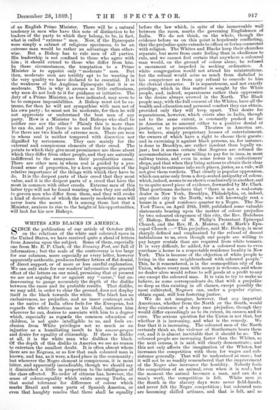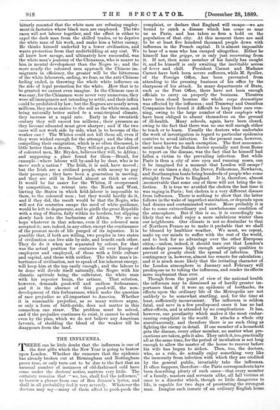WHITES AND BLACKS IN AMERICA.
SINCE the publication of our article of October 26th on the relations of the white and coloured races in the United States, we have received quite a shoal of letters from America upon the subject. Some of them, especially one from Mr. E. P. Clark, of the Evening Post, are full of information ; but the scale of the controversy is too large for our columns, more especially as every letter, however apparently authentic, produces further letters of flat denial, of direct support, or of more or less careful explanation. We can only state for our readers' information the general effect of the letters on our mind, premising that at present we are not arguing for or against any " cause," but en- deavouring to gauge accurately the depth of the dislike between the races and its probable results. That dislike, we may add, in order to clear the ground, does not display itself in the black towards the white. The black has no exclusiveness, no prejudice, and no inner contempt such as the native of India often feels for the European, but regards the white American as his ideal, imitates him wherever he can, desires to associate with him to a degree which, especially as regards the common education of children, is not quite intelligible to us, and feels ex- clusion from White privileges not so much as an injustice as a humiliating insult to his amour-propre and desire for equality of citizenship. If there is dislike at all, it is the white man who dislikes the black. Of the depth of this dislike in America we see no reason to entertain the smallest doubt. It is often absent where there are no Negroes, or so few that each coloured man is known, and has, as it were, a fixed place in the community ; but wherever the Negro element is conspicuous, it is most bitter, and apparently ineradicable, though we should say it diminished a little in proportion to the intelligence of the class affected. No order of citizens has, however, the sense of colour-equality which exists among Turks, or that social tolerance for difference of colour which marks Brazil and some parts of Spanish America, or even that haughty resolve that there shall be equality before the law which, in spite of the immoveable wall between the races, marks the governing Englishmen of India. We do not think, on the whole, though the evidence before us on this point is hopelessly conflicting,. that the prejudice quite extends to offices or forms connected with religion. The Whites and Blacks keep their churches separate, but more from caste feeling than in obedience to rule, and we cannot feel certain that anywhere a coloured man would, on the ground of colour alone, be refused a sacrament or impeded in seeking ordination. A white congregation would not attend his ministrations, but the refusal would arise as much from disbelief in his competence as from any refusal to concede to him the clerical character. It is separateness, and not exactly privilege, which in this matter is sought by the White people, and, indeed, separateness rather than oppression is the desire always avowed in the North. The Black people may, with the full consent of the Whites, have all the- wealth and education and personal comfort they can obtain, provided only they will keep apart. This desire for separateness, however, which exists also in India, though not to the same extent, is constantly pushed so far in America as to amount either to a positive denial of justice, or to persecution. Theatres in America are, we believe, simply proprietary houses of entertainment,. the owners of which have a right to choose their guests ;- and in exercising it against black persons, as, for instance. is done in Brooklyn, are rather insolent than legally un- just ; but it seems certain that Negroes are refused the accommodation they are willing to pay for in inns, in most railway trains, and even in some towns in confectioners' shops, and that when they bring actions to obtain their clear legal right to entrance into such places, juries, as a rule, will not give them verdicts. That clearly is popular oppression,. which can arise only from a deep-seated antipathy of colour, which, indeed, seems to us shown conclusively in another, and to us quite novel piece of evidence, forwarded by Mr. Clark. That gentleman declares that " there is not a real-estate dealer in New York, Brooklyn, Philadelphia, or, indeed, any other city in the North, who will knowingly rent a house in a good residence quarter to a Negro. The Neu, York Times, on April 28th, 1889, published some valuable statements bearing upon the matter of colour prejudice by two coloured clergymen of this city, the Rev. Hutchens C. Bishop, Rector of St. Philip's Protestant Episcopal Church, and the Rev. H. A. Monroe, of St. Mark's Epis- copal Church :—" This prejudice, said Mr. Bishop, is most sharply defined and emphasised by the refusal of decent habitations to us, even though our people are willing to pay larger rentals than are required from white tenants. It is very difficult, he added, for a coloured man to even purchase a house in a respectable residence locality in New York. This is because of the objection of white people to living in the same neighbourhood with coloured people." This, be it remembered, is in the cosmopolitan city of the Union, where every man with money is welcome, and where no dealer alive would refuse to sell goods at a profit to any one except the coloured man. It is vain to try to make us believe, as some correspondents do, that with a prejudice so deep as this existing in all classes, except possibly the most cultivated, Negroes can, under a popular regime, obtain equal, still less fostering justice. We do not imagine, however, that any impartial Americans, whether from the North or the South, would deny the existence of a deep race prejudice, though they would differ exceedingly as to its extent, its causes, and its cure. The serious question for the Union is not that, but whether it is increasing, and what is the remedy. We fear that it is increasing. The coloured men of the North certainly think so, the violence of Southerners bears them out, and it is almost inevitable that it should be so. The coloured people are increasing faster than the Whites, as the next census, it is said, will clearly demonstrate ; and this not only affects the imagination of the Whites, but increases the competition with them for wages and sub- sistence generally. That will be understood at once ; but it will not be so readily remembered that the improvement of the Negro also increases the hostility. Nobody feels the competition of an animal, even when it is real ; but the moment the animal becomes a man, and can do a man's work, the competition is felt. White men in the South in the slavery days were never field-hands, and never felt the Negro competition ; but coloured men are becoming skilled artisans, and that is felt, and so bitterly resented that the white men are refusing employ- ment in factories where black men are employed. The two races will not labour together, and the effect is either to expel the dark man from the skilled trades, or to deprive the white man of his work, and make him a bitter enemy. He thinks himself underbid by a lower civilisation, and wants protection from that underbidding at any cost. We all know how savage, and ultimately how successful, was the white man's jealousy of the Chinaman, who is nearer to him in mental development than the Negro is ; and the more nearly the coloured men approach the Chinese im- migrants in efficiency, the greater will be the bitterness of the white labourers, ending, we fear, as the anti-Chinese feeling ended, in throwing the whole white influence on the side of legal protection for the white. How that is to be granted we cannot even imagine. In the Chinese case it was easy, for the Chinamen were never very numerous, they were all immigrants not intending to settle, and their influx could be prohibited by law; but the Negroes are nearly seven millions, they are as native to the soil as the white men, and being naturally better suited to a semi-tropical climate, they increase at a rapid rate. Early in the twentieth century they will exceed ten millions ; their pressure as they become educated must grow sharper ; and if the two races will not work side by side, what is to become of the weaker one ? The Whites could not kill them all, even if they were wicked enough for the attempt ; and the idea of compelling their emigration, which is so often discussed, is little better than a dream. They will not go, as that ablest of coloured men, Mr. Bryden, believes they will, to Africa ; and supposing a place found for them—Brazil, for example—where labour will by-and-by be dear, who is to move such a nation ? The Irish, it is said, have moved ; but the Irish are a civilised people, with money to pay their passages ; they have been a generation in moving, and they are still in Ireland almost as thick as ever. It would be far easier for the Whites, if overpressed by competition, to retreat into the North and West, leaving the States in which field-labour is impossible to them, to the coloured men ; but they would hardly do it, and if they did., the result would be that the Negro, who will not for centuries escape the need of white guidance, would be left to degenerate, and to girdle the great Republic with a ring of States, fully within its borders, but slipping slowly back into the barbarism of Africa. We see no hope whatever in that scheme, even if the coloured men accepted it; nor, indeed, in any other, except the continuance of the present mode of life purged of its injustice. It is possible that, if both are willing, two peoples in two states of civilisation can live side by side, and benefit each other. They do do it when not separated by colour, for that was the actual position for centuries all over Europe of employers and employed., of those with a little culture and capital, and those with neither. The white man's in- heritance of civilisation, not to speak of his inherent energy, will keep him at the top easily enough ; and the labour to be done will divide itself naturally, the Negro with his climatic aptitude being the cultivator, the white man with his superior brain, the artisan. That solution, however, demands good-will and endless forbearance, and it is the absence of this good-will, the non- development of this forbearanee, which make the question of race prejudice so all-important to America. Whether it is reasonable prejudice, as so many writers argue, or only a form of birth-pride, does not matter in this connection one straw. The problem must be solved, and if the prejudice continues to exist, it cannot be solved even by the plan, which we do not believe any American favours, of shedding the blood of the weaker till he disappears from the land.



































 Previous page
Previous page